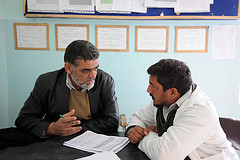There are many different tasks included in medical interpreter services. A medical interpreter can be expected to:
- Work face to face with patients and doctors.
- Preserve the original tone and nuance when providing medical interpreter services.
- Act as a medical interpreter via telephone in cases when time is of the essence.
- Interpret important information from family members, doctors and patients.

Completing an inspection checklist sent out by the Afghan Basic Package of Health Services, Farah Hospital pharmacist Nasrullah Noori speaks with Dr. Fazil Ghani, the resident doctor at the clinic, during a clinic assessment, Dec. 29, 2009. The clinic employs 14 staff members, including civilian guards, one doctor, one nurse, one midwife, a pharmacist and other administrative officials, and is open 24 hours a day. There is always a doctor here, said Mohammad Sarwar, an administrative professional at the clinic who has been in charge of the clinics logistics for the past three years. Noori travelled to the clinic in the Pusht Rod District of Farah Province, Afghanistan, with the Farah Provincial Health Director, Dr. Abdul Jabar, and other Farah Hospital medical providers; all of which were transported and accompanied by members of the Farah Provincial Reconstruction Team (PRT).
Oftentimes, a medical interpreter works in delicate or high-stress locations, such as an emergency room. Interpreters must be knowledgeable about the medical field; they must also have the empathy and tact to work equally well with patients and doctors. This is by no means a simple or easy job.
However, medical interpreter services often face the question of whether a medical interpreter can also provide written translation services. Should a medical interpreter be entrusted to translate crucial health documents, such as prescriptions and diagnostic reports? The International Medical Interpreters Association (IMIA) has answered in the negative, writing in the 2009 IMIA Guide on Medical Translation that medical interpreters must have unique skills in order to accurately translate written medical documents.
Medical translation is a highly specialized field that demands its own training. Certainly, medical interpreters and medical translators share some knowledge and skills. Both groups must be fluent in original and target languages. Additionally, translators and interpreters must possess enough cultural awareness to understand the meaning behind words.
However, medical translation and interpreting each require unique expertise as well. A medical translator is an expert in the written word; he or she must also demonstrate expertise with medical terms. In contrast, a medical interpreter is a whiz at on-the-spot, near-immediate interpreting. He or she specializes in speaking patterns, conveying original tone and body language, and other aspects of oral communication. Just as a professional speaker would have a very different skill set than a professional writer, medical translation and medical interpreting require different skills.
The exception to this rule is sight translation, which is a hybrid of interpreting and translating. An interpreter sight translates when he or she reads a written document aloud into another language. It’s not unusual for a medical interpreter to be asked to sight translate a medical document, such as a consent form, on the spot. The skill of sight translation requires practice and training as well, but in general, medical interpreter services may be trusted to provide this form of translation.
[ Photo by: isafmedia, on Flickr, via CC License ]


[…] https://www.affordablelanguageservices.com/can-a-medical-interpreter-be-expected-to-translate/ […]